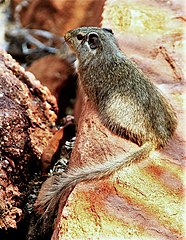Skałoszczurowate
| Petromuridae[1] | |||
| Tullberg, 1899 | |||
 Przedstawiciel rodziny – skałoszczur właściwy (Petromus typicus) | |||
| Systematyka | |||
| Domena | |||
|---|---|---|---|
| Królestwo | |||
| Typ | |||
| Podtyp | |||
| Nadgromada | |||
| Gromada | |||
| Podgromada | |||
| Infragromada | |||
| Rząd | |||
| Podrząd | |||
| Infrarząd | |||
| (bez rangi) | Phiomorpha | ||
| (bez rangi) | incertae sedis | ||
| Rodzina | skałoszczurowate | ||
| Typ nomenklatoryczny | |||
Petromus typicus A. Smith, 1831 | |||
| Synonimy | |||
| |||
| Rodzaje | |||
| |||
Skałoszczurowate[10] (Petromuridae) – monotypowa rodzina ssaków należących do Phiomorpha – kladu będącego odpowiednikiem kladu Caviomorpha grupującego południowoamerykańskie gryzonie[11] z infrarzędu jeżozwierzokształtnych (Hystricognathi) w obrębie rzędu gryzoni (Rodentia).
Zasięg występowania
Rodzina obejmuje jeden żyjący współcześnie gatunek występujący w południowo-zachodniej Afryce[12][13][14].
Morfologia
Długość ciała (bez ogona) 135–224 mm, długość ogona 116–175 mm; masa ciała 88–285 g[13].
Systematyka
Etymologia
Petromus (Petromys): gr. πετρα petra „skała”; μυς mus, μυος muos „mysz”[15].
Podział systematyczny
Do rodziny należy jeden rodzaj skałoszczur[10] (Petromus) z jednym występującym współcześnie gatunkiem[12][10]:
- Petromus typicus A. Smith, 1831 – skałoszczur właściwy
oraz gatunkami wymarłymi[16]:
- Petromus antiquus Sénégas, 2004
- Petromus minor Broom, 1939
Uwagi
Przypisy
- ↑ Petromuridae, [w:] Integrated Taxonomic Information System [online] (ang.).
- ↑ J. van der Hoeven & W. Clark (tłum.): Handbook of zoology. Cz. 2: Vertebrate animals. London: Longman, Brown, Green, Longmans, and Roberts, 1858, s. 684. (ang.).
- ↑ T. Tullberg. Über das System der Nagetiere. Eine phylogenetische Studie. „Nova Acta Regiae Societatis Scientiarum Upsaliensis”. Seriei tertle. 18, s. 147, 1899. (niem.).
- ↑ J.R. Ellerman: The families and genera of living rodents. Cz. 1: Family Muridae. London: British Museum, 1941, s. 149. (ang.).
- ↑ R. Lavocat: Les Rongeurs du Miocène d’Afrique orientale. Montpellier: École pratique des hautes études, Institut de Montpellier, 1973, s. 50, seria: École pratique des hautes études, 3e section. Mémoires et travaux de l’Institut de Montpellier; N° 1. (fr.).
- ↑ P. Swanepoel, R.H.N. Smithers & I.L. Rautenbach. A checklist and numbering system of the extant mammals of the southern African subregion. „Annals of the Transvaal Museum”. 32 (7), s. 161, 1980. (ang.).
- ↑ S.O. Landry. A proposal for a new classification and nomenclature for the Glires (Lagomorpha and Rodentia). „Mitteilungen aus dem Museum für Naturkunde in Berlin”. Zoologische Reihe. 75 (2), s. 302, 1999. DOI: 10.1002/mmnz.19990750209. (ang.).
- ↑ A. Smith. African Zoology. „South African quarterly journal”. 2, s. 146, 1834. (ang.).
- ↑ A. Smith. Contributions to the natural history of South Africa, & c. „South African quarterly journal”. 1 (5), s. 10, 1831. (łac. • ang.).
- ↑ a b c Nazwy zwyczajowe za: W. Cichocki, A. Ważna, J. Cichocki, E. Rajska-Jurgiel, A. Jasiński & W. Bogdanowicz: Polskie nazewnictwo ssaków świata. Warszawa: Muzeum i Instytut Zoologii PAN, 2015, s. 286. ISBN 978-83-88147-15-9. (pol. • ang.).
- ↑ S.K. Mouchaty, F. Catzeflis, A. Janke, U. Arnason. Molecular Evidence of an African Phiomorpha–South American Caviomorpha Clade and Support for Hystricognathi Based on the Complete Mitochondrial Genome of the Cane Rat (Thryonomys swinderianus). „Molecular Phylogenetics and Evolution”. 18 (1), s. 127–135, 2001. [dostęp 2011-03-26]. (ang.).
- ↑ a b C.J. Burgin, D.E. Wilson, R.A. Mittermeier, A.B. Rylands, T.E. Lacher & W. Sechrest: Illustrated Checklist of the Mammals of the World. Cz. 1: Monotremata to Rodentia. Barcelona: Lynx Edicions, 2020, s. 544. ISBN 978-84-16728-34-3. (ang.).
- ↑ a b R. López-Antoñanzas: Family Petromuridae (Noki). W: D.E. Wilson, T.E. Lacher, Jr & R.A. Mittermeier (redaktorzy): Handbook of the Mammals of the World. Cz. 6: Lagomorphs and Rodents I. Barcelona: Lynx Edicions, 2016, s. 341. ISBN 978-84-941892-3-4. (ang.).
- ↑ D.E. Wilson & D.M. Reeder (redaktorzy): Genus Petromus. [w:] Mammal Species of the World. A Taxonomic and Geographic Reference (Wyd. 3) [on-line]. Johns Hopkins University Press, 2005. [dostęp 2022-03-11].
- ↑ T.S. Palmer. Index Generum Mammalium: a List of the Genera and Families of Mammals. „North American Fauna”. 23, s. 527, 1904. (ang.).
- ↑ J.S. Zijlstra: Petromus. Hesperomys project. [dostęp 2022-03-12]. (ang.).
Media użyte na tej stronie
Autor: (of code) -xfi-, Licencja: CC BY-SA 3.0
The Wikispecies logo created by Zephram Stark based on a concept design by Jeremykemp.
Autor: Vernon Swanepoel, Licencja: CC BY 2.0
A Dassie Rat, image taken at Twyfelfontein, in Kunene, Namibia

